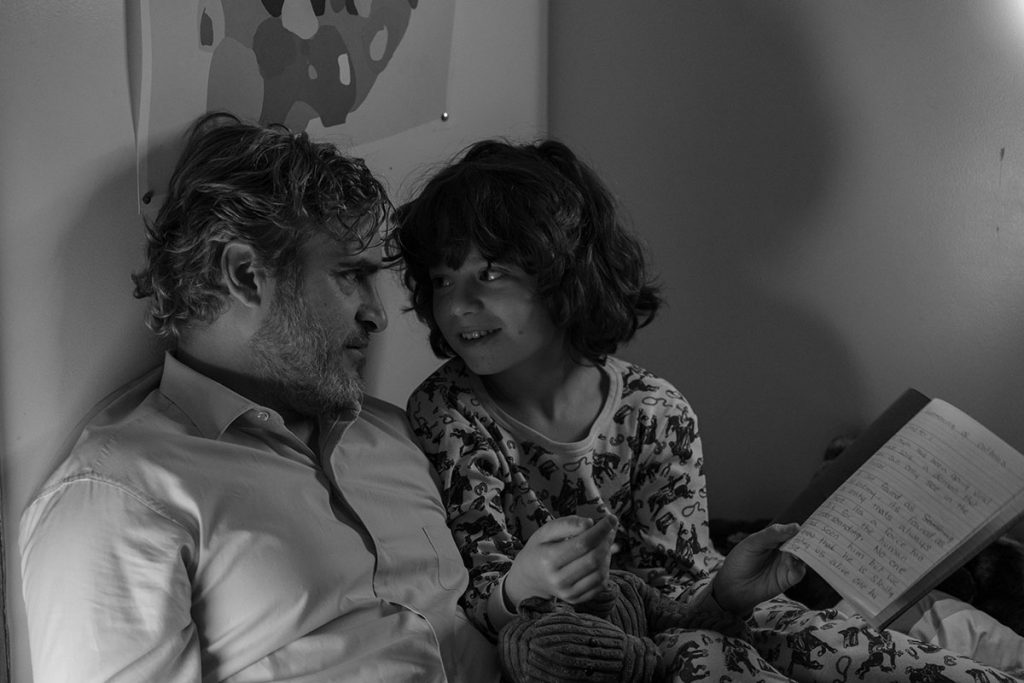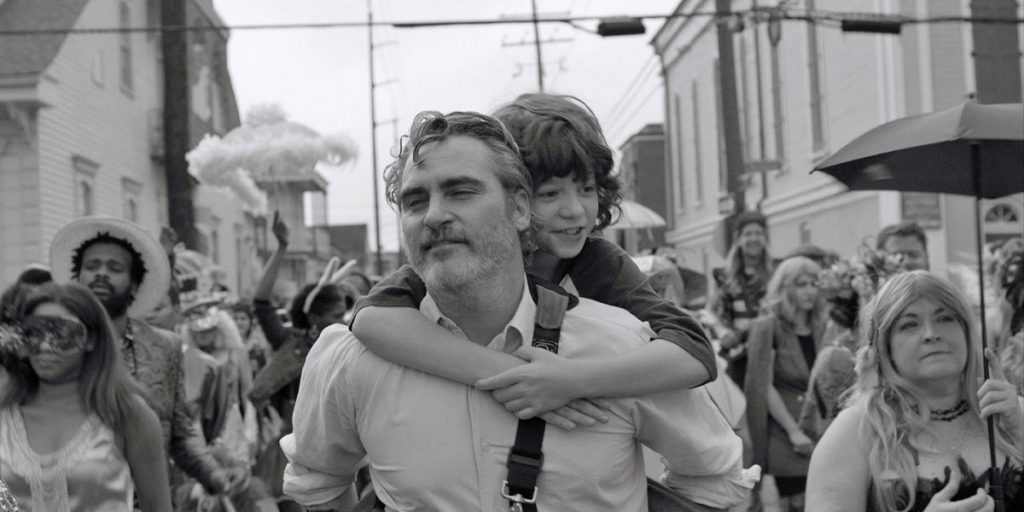C’mon C’mon is a resonant reminder of the capability of compassion and communication to cure our emotional ills, led lovingly by Joaquin Phoenix & Woody Norman.
Mike Mills is one of our most humanistic filmmakers. When you’re watching a Mike Mills movie, it feels less like viewing a film and more like being in the presence of real people, with his cinematic anecdotes always rooted in authenticity – authentic emotion, authentic narrative evolution, etc. – and no sense of artificiality or exaggeration to be found. Mills resembles a documentarian in that way as, although his films are “fictional,” they are inspired by his real-life relationships (Beginners being based on his father’s late-in-life coming out, 20th Century Women chronicling his childhood with his single mother), and they retain this realism throughout, keeping a focus on the compelling characters at their core instead of on preposterous plot turns or an excessive escalation in the narrative’s stakes.
Some may call this storytelling approach “minimalistic,” but though these tales are often small in scope or scale, the intense feeling embedded into these films is formidable, and their understated sentiment sneaks up on you when you least expect it. This filmmaking technique has been Mills’ trademark for nearly two decades, but with this year’s C’mon C’mon, he flawlessly fine-tunes that formula, resulting in not just one of the best movies of 2021, but his undeniable and unequivocal masterpiece.
C’mon C’mon centers on Johnny (Joaquin Phoenix, of Joker and Her), a radio journalist working on his passion project where he interviews children of diverse backgrounds in cities all across the U.S. about the world’s uncertain future, focusing on our racial conflicts, our climate crisis, and other assorted social ailments to survey the youth on where they think humans are headed in the potentially cataclysmic years to come. Though he is deeply affected by their open and honest answers, Johnny himself has yet to get to know the children of our world in any personal way – but all that is set to change with one phone call from his estranged sister, Viv (Gaby Hoffmann, of Girls and Transparent).
When Viv has to go tend to her former husband, Paul (Scoot McNairy, of Argo and Batman v Superman: Dawn of Justice), who finds himself on the brink of a mental breakdown, she needs someone to look after her 8-year-old son Jesse (Woody Norman, of The Current War and The White Princess), and even though Johnny hasn’t seen him in years, he’s all Viv’s got. Within moments, Johnny is instantly intrigued by this innocuous and irreverent child, who fills up a room with his wild thoughts and invites the world into his idiosyncratic imagination. And, as the two spend more time together – with Jesse accompanying Johnny on trips for his project to New York and New Orleans – they both come to grow in ways neither knew were possible, emerging from this experience with new outlooks on life.
Drawing on his connection with his child, Mills once again uses his own feelings as fodder for cinematic catharsis, compassionately characterizing this beautiful bond between Johnny and Jesse in a way that allows us to also participate in this road-trip-therapy-session-of-sorts right alongside them, learning to slow down, wholly see our surroundings, and find an appreciation for the finer things in life instead of treating everything like a task that need to be taken care of as soon as possible. Rather than passively observing their talks, Mills includes us in this intercommunication, particularly as Johnny and Jesse ponder life’s largest questions about where we’re going, where we’ve been, and what really matters when all is said and done. What’s most refreshing is that C’mon C’mon doesn’t treat Johnny as some “wise old mentor” imparting knowledge onto an innocent, nor does it act as if Jesse is his uncle’s “sole savior” who saves him from a “spiritless existence”; instead, there’s an equal amount of wisdom that each character both relays and receives, subverting our expectations for this type of film.
We’ve seen plenty of movies about a wisened adult taking a youngster under their wings and “showing them the ways of the world” or those centered around a child pushing an elder to “rediscover their purpose in life” via their innocent insight, but C’mon C’mon is too smart to indulge in such stereotypical storytelling, and it’s the reciprocal relationship between Johnny and Jesse that makes their specific saga so special. It’s especially stirring to see how Johnny helps Jesse control his occasionally erratic emotions as he’s confronted with stimuli and situations far beyond what an 8-year-old should be asked to engage with, but it’s even more moving to witness the way Jesse educates this seemingly well-studied journalist, a man who thinks he’s seen and knows it all.
So often society looks down on our youngest generation, telling them they “don’t know what they’re talking about” when they speak out on important issues or try to instruct adults how to act. And yet, the dirty little secret is that adults are just as clueless as they assume children are – and, in many ways, we can actually learn more by entering their experiences and letting them open our eyes instead of the other way around. We can acquire just as much knowledge from kids as they can from us, and C’mon C’mon lovingly honors that lesson here.
In a riveting 180 from his last role (2019’s Joker), Joaquin Phoenix revisits the resonant poignancy of his part in 2013’s Her to play the patient but pained Johnny, a man clearly looking for that missing “something” in his life after several setbacks (the death of his mother, the estrangement from his sister, the separation from his partner, etc.) and finding it in the form of his young nephew. It’s fascinating to watch Johnny work through his faults (namely a short temper and quick judgment) via his conversations with Jesse, and Phoenix is a mightily playful scene partner for Norman, filling the screen with his arresting fatherly aura and truly selling us on their strong tie to one another.
And Norman, for his part, is most certainly no slouch either, turning in one of the most masterfully charismatic and emotionally complex child performances in years, demonstrating that he’s more than able to handle the dark drama of the piece when the moment demands it, but also retaining an overwhelming optimistic outlook on the possibilities of the future that quickly becomes contagious. Gaby Hoffmann similarly delivers supremely solid work as Jesse’s far-off mother, bringing such captivating sincerity to her phone calls with Phoenix’s Johnny (and subsequent meditations on motherhood) that it feels as if she fills every frame of the film, regardless of if she’s actually physically present or not – her soulfulness simply lingers.

Also of note is Robbie Ryan’s resplendent black-and-white cinematography, which gives the film a terrifically timeless and classically compelling complexion, while brothers Aaron and Bryce Dessner (of The National fame) simultaneously serve up a spirited score that further enhances the endearing atmosphere of the entire endeavor. It’s truly all too rare to find a film where every element works so wonderfully in tandem as they do here in C’mon C’mon, and that’s the secret to the story’s success – every actor and accomplished member of the crew is so totally tuned in to the tone that Mike Mills is carefully curating here, and it shows in the picture’s powerful emotional pull.
In a world full of fire, ferocity, and fervor, Mills reminds us that the best path forward is the openhearted one, forged by compassion and communication instead of intensity and insolence. C’mon C’mon assures us that we’re all equally lost in this large, lonely world, but when we share this struggle with another and allow ourselves to be vibrantly vulnerable, the sorrow we shoulder becomes a little bit smaller, day by day – and as long as we keep pushing on, it’ll soon be as light as a feather.

